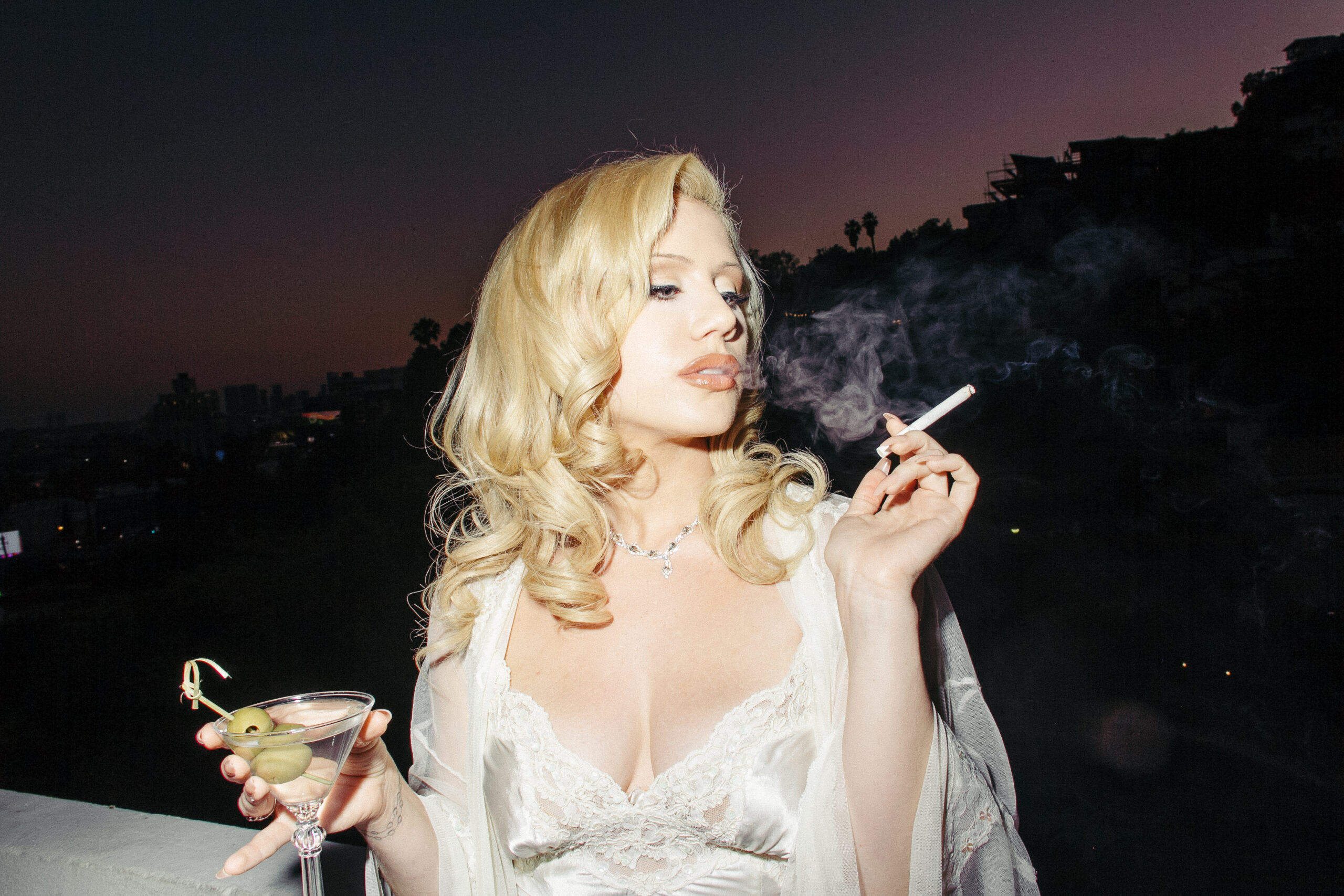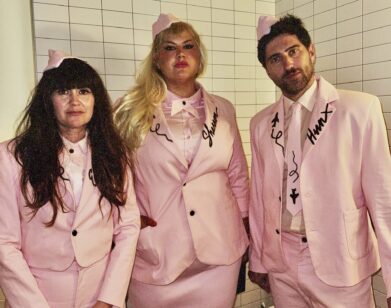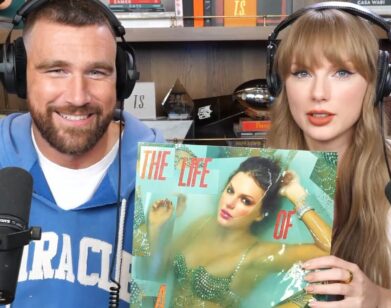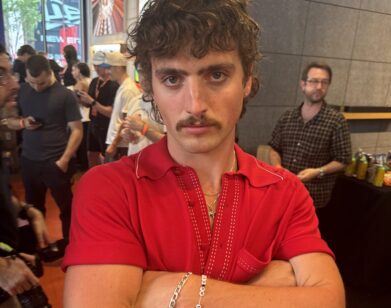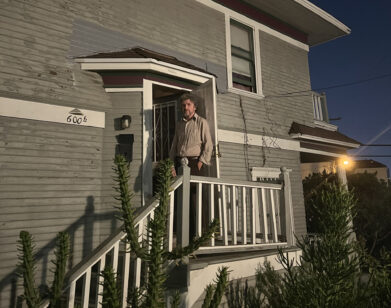THE FAME
Slayyyter on Fame, Starfucking, and Defying the Hyperpop Label
Like generations of young ingénues before her, Slayyyter came to Los Angeles with a voice and a dream. But like most Hollywood starlets, she discovered that beneath the shimmering surface of show biz hides a lurid darkness. On her new album, STARFUCKER, out tomorrow,, the 27-year-old deftly explores the many sides of the Hollywood machine, toggling between opulent visions of the silver screen and Lynchian nightmares set to techno beats. Over the course of its 12 tracks, Slayyyter plays both star and fucker, depicting the glimmer and grit of contemporary stardom. “Part of me would do whatever it takes to make my dreams come true,” she tells me. “[But] I don’t want to compromise my artistry just to win the game. It’s not worth winning if I can’t do it my way, you know?”
It makes sense that fame weighs heavy on the pop star’s mind. The St. Louis-born singer’s profile has risen steadily since 2019, when her singles Daddy AF and Mine solidified her as the internet’s most exciting purveyor of progressive pop music. Her self-titled mixtape and debut album, Troubled Paradise, helped her build a following of queer, pop-obsessives, which led to gigs opening for the likes of Charli XCX and Tove Lo. But if her past work was still tied to the DIY, bedroom ethos that launched her career, STARFUCKER is her red carpet debut. Earlier this month, I talked to the Belladonna herself about what fame feels like now, the possibilities of pop, and what she calls the “Hollywood sausage factory.”
———
SLAYYYTER: Hello.
TOBIAS HESS: Hey.
SLAYYYTER: How are you?
HESS: I’m doing good. How are you?
SLAYYYTER: When I heard that you were interviewing, I was so excited because you know I love your Substack.
HESS: I was so gagged when I learned that you read my stuff. That meant the world.
SLAYYYTER: Oh my god. Of course. I feel like you have such interesting takes on things. I eat it up.
HESS: Oh, thank you. Well, I feel like you are doing the things I’m interested in, like in practice. Today, even major pop stars are on social media like, “Hey guys, I’m in the car and I think I made the song of the summer.” And with this album rollout, you are coming on like, “I am actually the most famous woman in the world and I am mysterious. And no one knows me, and I’m fucking Slayyyter.” If that makes sense.
SLAYYYTER: Yeah, definitely. I don’t want to be like the cranky old grandma that’s like, “TikTok is ruining the music industry.” That’s not my vibe, and I think it has helped in a lot of ways. But it is very weird to see legacy artists that I grew up loving so much for the mystique kind of play the game. You can tell that their team is telling them to do things. It just feels weird. Everyone’s trying to be so relatable, but when I was a little kid I didn’t love pop stars because they were relatable. I loved them because it was unattainable and magical.
HESS: Was that an active choice to do things differently with this rollout?
SLAYYYTER: I feel like I’m always going to do things my way, and it’s just not in my nature to be like that. When people hang out with me and get to know me, they’re surprised that I have a funny little sense of humor. I feel like I let that out on Twitter for the most part. But I’m not a YouTuber. That’s just not who I am. It’s not why I started making music. So it’s very weird to have this kind of requirement now. And it’s depressing but also, I can’t hate people that do it and do it well. But there’s just never going to be a moment where I’m like, “Have you ever been heartbroken and gone to a Hollywood party and cried? Well, this song’s for you.” That’s just not for me.
HESS: But you still have to use social media, and you have to promote your album. So how do you navigate that?
SLAYYYTER: I feel like my focus right now is being able to make short-form content that’s in line with the music and feels really cinematic. I’ve been struggling with getting budgets for stuff lately, but I feel like the big budget music video doesn’t really do for an artist what it used to do. So when you’re a smaller artist, it’s hard to convince a label to be like, “Hey, can you put $100K behind this video?” Because that return is not really getting met. So it’s like, “How can I make big things with zero budget in my house and get shifty with the lighting?”
HESS: Well, I’ve heard the album and it’s amazing. I’m really excited for it to be out in the world. Is this the same girl that we know from Self-Titled and Troubled Paradise, or a new kind of persona?
SLAYYYTER: I feel like it’s the same girl from the mixtape, for sure; the celebrity obsession and all of that, which is a character, an extreme version of myself. People hate to admit that they ogle over celebrities and celebrity culture. I’ve always loved a blind item TikTok. Ever since I was little, I would watch TMZ videos of Paris Hilton leaving the club. I’m fascinated by that world, and the album kind of touches a lot on that stuff in the same way that my older music and all of those escapist pop records touched on it.
HESS: What made you call it STARFUCKER?
SLAYYYTER: I was having a conversation with my DJ in Nashville about Hollywood and the music industry. He’s like my big brother, honestly, and he always calls it “the Hollywood Sausage Factory.” It can feel very soul-sucking. Like, I want to make music that’s cool to me. But then you’ll do sessions and they’ll bring me concepts like, “You should make a sugar-daddy song.” And I’ll be like, “No, that’s not my vibe.” It’s just interesting what people want to get out of you, and I feel like everyone in L.A. is a starfucker in a sense. But at the same time, I’m a smaller artist, and I still feel like I get starfucked by people. So it’s not just about having sex with celebrities. It’s a metaphor for just being in entertainment and being on the cusp. Part of me would do whatever it takes to make my dreams come true and have something crack off, but at the same time, I don’t ever want to compromise. I don’t want to compromise my artistry just to win the game. It’s not worth winning if I can’t do it my way, you know?
HESS: Totally. Do you feel like your relationship to “starfucking” is different now than when you first got to L.A.?
SLAYYYTER: Absolutely. When I first got here, I was a hair-salon receptionist, I was a waitress. I dropped out of college. I made music because I have always loved music. But I didn’t expect any of this to become a real career. At the same time, I had a really serious drug and alcohol problem that was destroying what could have blossomed into something bigger. Now I feel like I’m a lot more mature and this is more of a career to me. I wake up and I do my job. I wear my little glasses. I’m trying to keep my career going and keep this sustainable income so I can live in my apartment and have food on the table. Whereas before, it was just like, “O, my god, I’m so cool. I’m getting invited to all these parties.” I didn’t really know what I was doing.
HESS: How do you make money from music? It’s so amorphous, and everyone is faking it all the time. It seems like it’s social currency rather than money currency.
SLAYYYTER: Yeah. It’s crazy. It’s almost like labels have been like, “Ugh, we’re going to go find the next big TikTok star.” And it’s interesting because I’ve been watching crops of artists coming and going, signing to labels, making the announcement that they’re independent now. And the things that labels want the most, the virality they’re really pining for, doesn’t really equal a sustainable career. You can have a viral song on TikTok and you might never sell out a 200-cap room a day in your life. The goalposts for success keep changing. It’s putting a lot of pressure on artists that have been around for a little bit, people who are on the cusp. I have my audience. I have a touring career, but I definitely don’t have a real hit song yet, per se. But nothing’s going on social, so nobody wants to fund it.
HESS: Do you have a stan army name?
SLAYYYTER: I call them my Cathy Girls, because my name’s Cathy. I’ll just be like, “Hey, Cathy Girls.” But I don’t think it’s that official. I’m not like, “Hey, Cathy Nation, rally up.”
HESS: Well, maybe this album will rally Cathy Nation. What does success look like to you with this album?
SLAYYYTER: I can only make my music the best that it can be from where I stand, and that doesn’t always mean it’s going to be a hit with everyone. I think pop music has also become a little uncool in mainstream culture. Everything is really cyclical, so maybe when pop music comes back, I’ll change my mind and be like, “Oh, I really do want a big hit.” But a hit song doesn’t really mean the same thing that it did a couple years ago. It’s kind of just a weird benchmark thing for people, but it doesn’t really have lasting power. You know what I mean? I always use this as an example, but “Single Ladies” is one of my favorite examples of a hit song and video that was a phenomenon. Everyone was doing the dance. It had such lasting power. When I think of Beyonce, I think of that song. It’s so iconic. And hits now, they just don’t resonate in that way. So I don’t know if I’m looking for that, I guess. I would rather keep my sights set on making things get bigger and bigger as the years go by. Every year you improve, and every album is an improvement, not a decline in quality. I feel like I’ve been doing that really well where everything’s been getting better and better.
HESS: Tell me a bit about the album itself. What were your references?
SLAYYYTER: I was in a two-year relationship, and I feel like that was informing my tastes a lot. Even though we broke up, I will give props to my ex that they definitely showed me movies that started to shape the palette for this. I was watching a lot of Brian de Palma films. And Basic Instinct. To me, this album sounds like Basic Instinct, if that makes any sense. I was also listening to Kavinsky. I remember watching Drive with my ex, and I was like, “Oh my god, I love this song. I love Kavinsky.” And then I was trying to chase that kind of electro sound and was listening to a lot of Peaches. And my ex was taking me to punk shows in LA for the first time. I had never been to a punk show before and that really changed my world. I was like, “Whoa, the energy here is crazy and I want to get this insane, raw, unhinged energy out of people.” This album is so special to me because it’s such a glamorized version of my real life.
HESS: There’s a lot of very specific references and sounds and symbols from very different times, but it still feels cohesive. In a sense, it’s an ode to pop music.
SLAYYYTER: Yeah, I wanted it to feel more timeless than some of my other projects. I feel like there’s some classic Slayyytery-sounding songs, like “Plastic” with the really harsh clang and metallic sounds. But for the visuals, it could be current Hollywood, it could be old Hollywood, it could be 1980s erotic-thriller Hollywood. I borrowed from all these different little eras because I wanted it to feel like something that was really different, not so internet vibes, which has kind of been my thing since I started.
HESS: That makes a lot of sense. Correct me if I’m wrong, but when you were coming up, there was a narrative around hyperpop and internet music and “Heaven.”
SLAYYYTER: Yeah. I feel like everyone got put under this blanket term. I never thought I was hyperpop, but people definitely think I am. I feel like me and Ayesha [Erotica] were never calling the music we were making together “hyperpop.” I think I felt a little devalued as an artist by some of the hyperpop language, just because I always thought I was beyond any scene. I’m introverted in a crazy way. I don’t like being a part of music scenes. I’m not friends with a lot of other artists. I keep things to myself. And so I was always like, “Hey, wait a minute. My music doesn’t sound like all this other hyperpop music, so why am I being called that?” I wanted to be seen as a pop vocalist. That’s not what I was setting out to do at the time, but I love it.
HESS: I kept thinking about the last line of the teaser for the album, “Fame is forever.” How tongue-in-cheek was that?
SLAYYYTER: I’m always kind of joking, but I’m not, you know what I mean? With this album, a lot of it has to do with the end of the relationship I was in, which started to decline because of how busy I was getting with touring and music. Everything was about me, me, me all the time, which is hard for other people to grasp. So the whole “fame is forever” thing is about how sometimes I’ll get really sad about the fact that it’s hard for me to date and have relationships with people because it’s narcissistic by nature to be an artist. You’re constantly on phone calls, talking about yourself. Right now, we’re talking about me. It’s hard to turn that off in a relationship. But at the same time, I can be sad about that, but what I’ve built, to me, is such a lasting thing. I’m not a huge artist. I’m not a very famous person, but I would hope when I die one day, my music has touched people. I’m just kidding.

